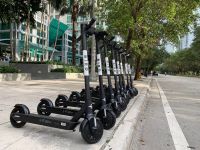
Members are once again asking questions about fire safety for e-bikes, e-scooters and other light electric vehicles (LEV), alongside the installation of EV charging stations. This is an evolving risk area and members should consider the developing situation.
Lithium-ion (Li-ion) fires are on the rise in WA with the Department of Fire and Emergency Services (DFES) responding to over 70 fires by June 2024. The state is well on track to surpass the previous record of 110 Li-ion fires . E-rideables have been the main ignition source for these fires.
We're aware that some members have started using the devices, integrating them into their fleet, and others are considering the potential benefits. Others still are installing EV charging areas at their facilities. LEVs come with many benefits, however it's important that members carefully consider and manage the risks they present.
Increased danger with Li-ion fires
DFES advises that batteries of cheaper products have flooded the market in recent years and are now becoming damaged or reaching their end-of-life. These batteries are being replaced by incompatible alternatives, posing a serious fire risk.
Batteries that enter thermal runaway and explode can start a fire metres away from where they are being charged, potentially engulfing a large area the size of an entire home in a matter of minutes.
Thermal runaway involves violent bursting of one or multiple battery cells, hissing and release of toxic, flammable and explosive gases, and an intense, self-sustaining fire.
For more information on lithium-ion batteries and responding to li-ion fires visit the DFES website.
Resources for members
The potential risks of a li-ion fire to people and assets are significant. For members, the key concerns are staff use, with regard to fleet, and charging of EV. The installation of EV chargers also needs careful consideration to make sure that installation, management and maintenance of the facility for its lifetime is factored into the acquisition decision.
LGIS has two resources for members on the subject.
- Electric vehicle charging areas, property conservation guidelines (October 2023), and
- Managing the fire risks associated with micro-mobility options.
Members can also contact the LGIS Fleet Risk team for further information.
